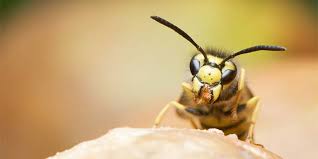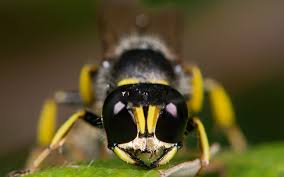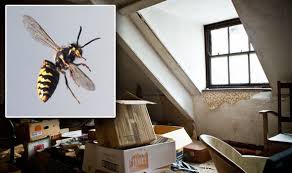How To Properly Remove Wasps From Your Property
How To Properly Remove Wasps From Your Property
The dog days of summer are here to stay, and you’re most likely enjoying them by spending time outside. But there is one flying friend you don’t want joining your barbecue: the wasp. Yellowjackets, paper wasps and hornets are common types of wasps that all seem to build their nests in places you don’t want them.
These insects are often seen as pests because of their painful stings, but they are important for the garden. After all, they’re predatory insects as well as pollinators. However, if their nests get a little too close for comfort or if you’re allergic to their stings, you probably don’t want them buzzing around you. With this in mind, we will discuss how to create an unwelcoming environment for wasps and how to eliminate their nets when necessary.
Deterring Wasps
Instead of removing the nest, you can always create an environment that the wasps will find unpleasant. Consider growing plants they dislike. These include eucalyptus, citronella, mint and wormwood. A bonus: these plants will also help deter mosquitos.
If planting isn’t your thing, try hanging a fake nest. Wasp colonies are incredibly territorial. When they believe another colony is already making a home in the area, they are likely to move on to another location. You can purchase a fake nest online, or you can create your own. To do this, fill a brown paper bag with crumpled-up newspaper and seal off the opening with tape. Next, crumble and shape the bag a bit to make it look like an actual wasp nest. Finally, hang it in an area where you don’t want wasps buzzing around.

Common types of wasps
Three types of wasps commonly seen in Vancouver are the European Paper Wasp, Yellow Jackets and Hornets.
The European Paper Wasp
The European Paper Wasp has long legs with a slender body that is about ¾ of an inch in length and narrows at the waist. The body of this wasp is black with yellow markings.
Yellowjackets
Yellowjackets are about the same size as bees. However, they do not carry pollen. Instead, they feast on meat. Yellowjackets can use their stingers repeatedly.
Hornets
Hornets are the largest of the three types of wasps. You can identify hornets by their black and white bald face. They too can sting repeatedly.
Reasons you may have wasps
Wasps will generally make their nests on the exterior of houses, in eaves, soffits and rain gutters. At times, they might make their way indoor. Wasps may be attracted to your home if you have lots of flowers and other plants. If you have food scraps left in your outdoor eating areas, spilled drinks that have evaporated to leave a sticky residue, and garbage bins that have not been properly covered, this is also an invitation for wasps. Insects and spiders are prey for wasps, so if you already have a problem with such pests, you might find that wasps are drawn to your home for that reason.

Wasp Removal Options
Most pest management professionals will offer homeowners the option of chemical-free wasp removal for foraging wasps that have become bothersome. The most common option used to naturally remove wasps is through the use of traps. Typically these contain a pesticide-free liquid that lures the wasp into the trap and are designed to make an escape improbable. Unlike homemade traps, professional traps are more successful because of their construction and placement. Made of high-quality materials with specially designed apertures, pest management professionals will strategically place these traps around your property where wasps habitually forage. These areas include outdoor bars, gardens, outside eating areas, near patios, and children’s play areas.
Organic Options For Wasp Removal
In addition to traps, pest management professionals may offer organic sprays as an option. Much like chemical pesticides, organic sprays are applied directly to wasp nests and work quickly to kill the wasps. Unlike chemical pesticides, however, organic sprays offer homeowners peace of mind in regards to the impact on their health, the soil, and overall environment.
Typically, the treated nest is left in its location after spraying. This ensures that returning wasps are also eradicated once they enter the nest. Additionally, wasps that return to find their home removed will typically build a new one. By leaving the treated wasp nests in place, the pest management professional is applying an effective control measure for the future.

DO’S AND DON’TS FOR WASP NEST REMOVAL AT YOUR PROPERTY
Do’s
- Call the professional pest control service providers for this risky job. They have the right skill, proper equipment and vast experience that are highly required to execute such kind of tasks.
- Choose the time of dusk or dawn to remove the nest because this is the time when the wasp nest is supposed to be less active and less risky.
- Do your research part well enough before approaching the nest. Collect as much information as you can about the basic characteristics of the wasps to understand how do they react when you attack their habitat.
- Be well-equipped with the right tools and wear the PPE or personal protective equipment to keep yourself safe from the attack of those angry insects.
- Wait for a couple of days to be sure that all the wasps inside the nest are eliminated before destroying the nest to be on the safer side.
Don’ts
- Do not approach the nest directly at the daytime. This is the time when the wasps are in their best active mode. They can be in their most aggressive form at that time which may be an extremely painful experience for you.
- Never try to remove the wasp nest on your own if you find it very close to the windows or doors of your home. It will trigger the chance of having a wasp attack inside your home, and your loved ones can be in danger.
- Never try to put the nest on fire. This will make the wasps terrified, and they will be in their best-attacking form to save their nest. Be gentle and follow the rules.
- Do not go to attack the nest without any personal protection. If you cannot arrange PPE for yourself, try wearing full sleeves shirts and full pants. Wear a hat or cover your mouth and head with thick clothes. Keep the eyes open but try to wear glasses to protect them from the attack of the wasp’s strings.
- Never ignore or take the matter of safety lightly while dealing with wasp nest on your own.
How To Deal With Wasp Nests On Your Property
If you have a wasp nest on your property, we don’t recommend trying to eliminate it on your own. Wasps have the capability to swarm you and sting repeatedly if they feel threatened, which they may if you start approaching their nest with a large bottle of pesticide. The best thing you can do is avoid the nest and call in the pest control professionals to take care of the nest for you. But there are a few things you can do in the meantime:
- If dining outdoors, keep in mind that sweet food and drinks will attract hungry wasps. As summer wears on, the wasps will get hungrier and hungrier, especially as their colonies grow. Your food looks just as tasty to wasps as is it does to you, so it’s wise to keep it under wraps.
- Trash cans can also attract hungry wasps. Keep a tight fitting lid on trash cans and don’t leave trash outdoors simply tied up in a plastic bag- this won’t be enough to keep wasps out of it.
- Avoid wearing brightly colored clothes or floral scented perfumes or lotions when spending time outdoors. Bright colors and flowery scents can attract wasps in the same way that your food will.
- If a wasp starts to buzz around you, don’t start slapping at it or act erratically. This can alarm the wasp and put it on the defense, which can cause it to sting you.
- If you should get stung by a wasp, keep a close eye on it! Some people may not realize they have an allergy to the sting of stinging insects, so if there is unusual swelling, trouble breathing or what seems to be an allergic reaction, contact emergency medical assistance immediately!
Although wasps can be a problem on your property when they nest inside your home or threaten your family, these are actually quite beneficial insects. They are known for eating pest insects and have even been deployed by the agricultural industry into farms and orchards to eliminate pests that are eating the harvest. So although they can be helpful, they can also be problematic, as they were for the mother we recently helped with the son that’s allergic to wasp stings.
If you are dealing with a wasp problem on your property and you feel like they are starting to invade your space, please contact a pest control professional to help you get rid of these insects and their nest without causing problems for you or your family members.